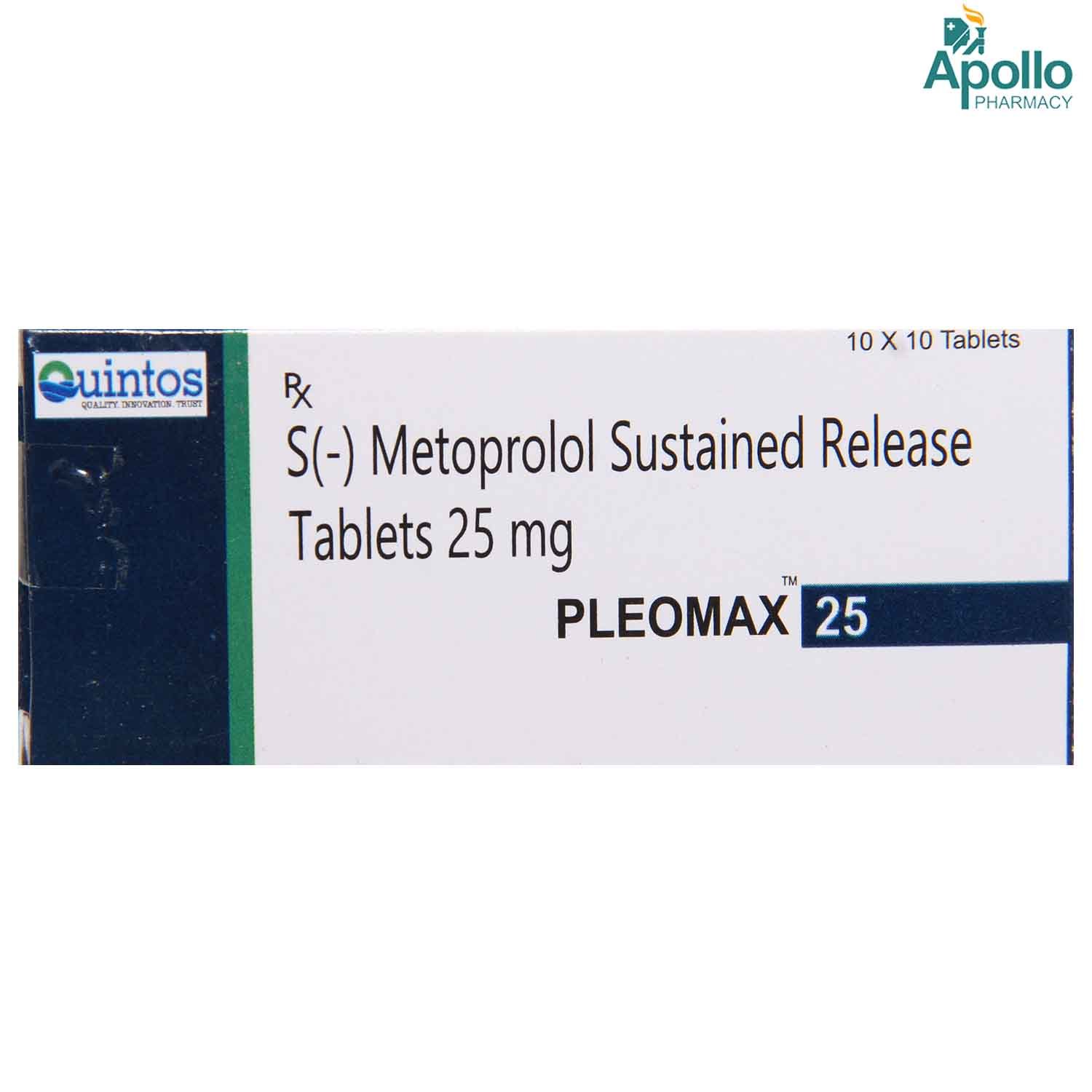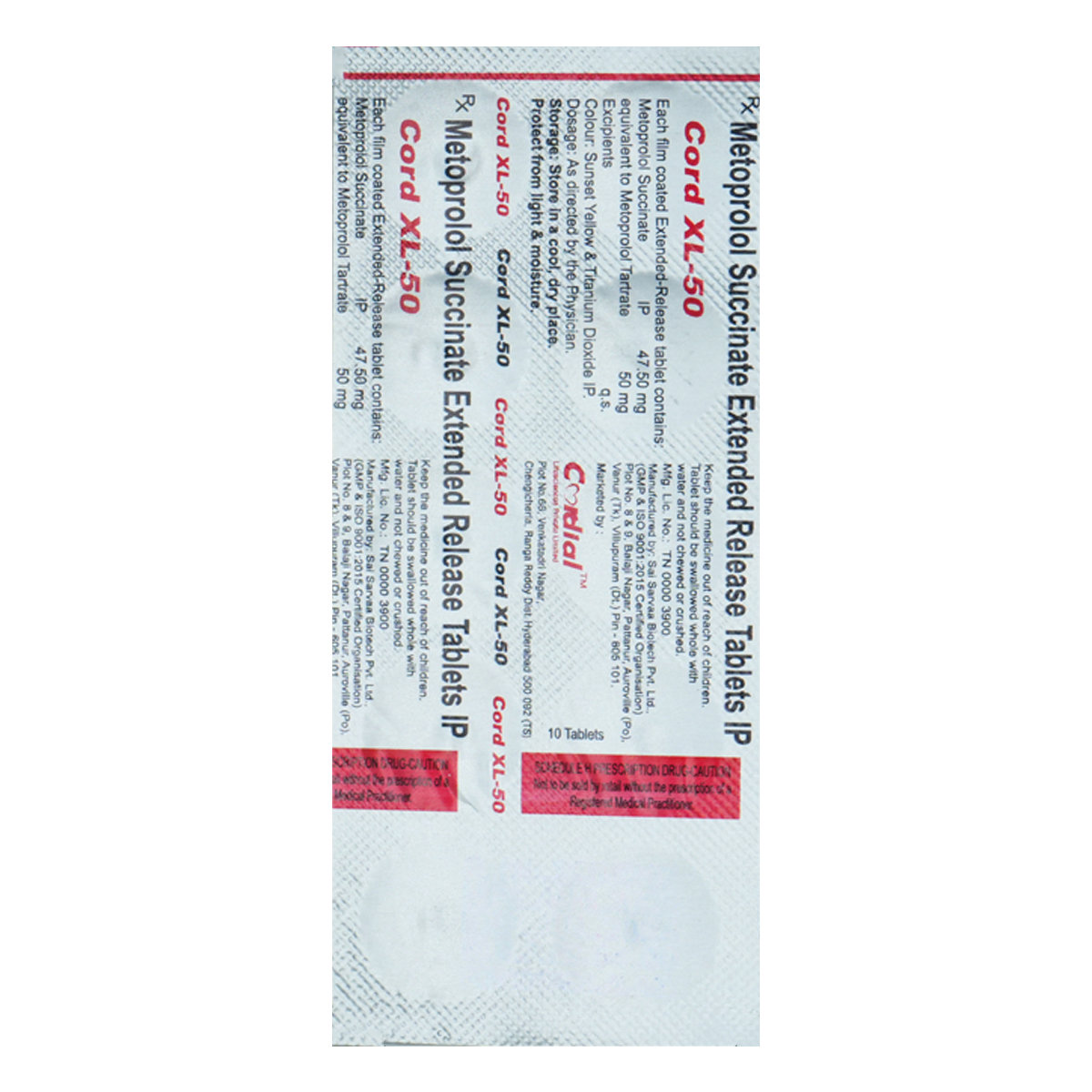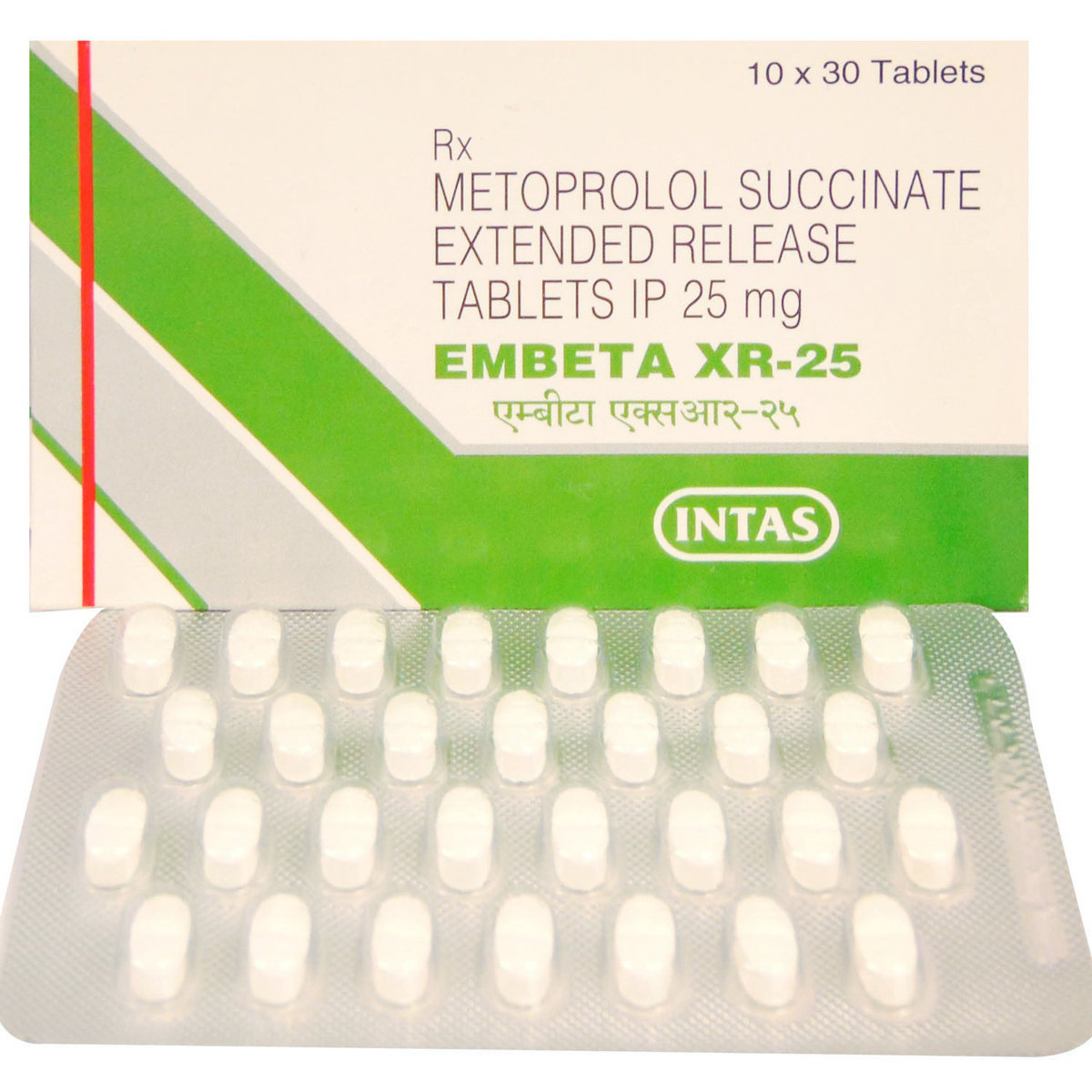Metoprolol Tartrate
About Metoprolol Tartrate
Metoprolol Tartrate belongs to a group of medicines called “Antihypertensive” used alone or together with other drugs to treat high blood pressure (hypertension), symptoms caused by an overactive thyroid gland, heart-related chest pain (angina), heart rhythm disorder (arrhythmia). Besides this, it also helps in relieving symptoms of migraine-related headaches. High blood pressure adds to the workload of the heart and arteries. Hypertension or high blood pressure is a long-term force of the blood against the arteries that may lead to various heart diseases. It can damage the blood vessels (arteries) of the brain, heart, and kidneys if it continues for a long time, resulting in a stroke, heart failure or kidney failure. Lowering blood pressure reduces the risk of stroke, heart attack and heart-related chest pain (angina).
Metoprolol Tartrate plays a vital role in relaxing blood vessels by blocking the action of certain natural substances in your body. It helps slow down the heart rate, making it easier for pumping more blood around the body. This lowers your blood pressure and reduces the risk of having a stroke, a heart attack, other heart problems or kidney problems in the future. Metoprolol Tartrate needs to be taken regularly to be effective.
You are advised to take this medicine for as long as your doctor has prescribed it for you depending on your medical condition. In some cases, you may experience certain common side effects, such as tiredness, dizziness, stomach pain, nightmares, irregular heart rate and skin rash. Most of these side effects do not require medical attention and gradually resolve over time. However, if the side effects are persistent, reach out to your doctor. However, you are advised to talk to your doctor if you experience these side effects persistently.
Don't stop taking this medicine without talking to your doctor first. Stopping abruptly may cause changes in your heart rhythm and blood pressure, cause chest pain or a heart attack. Your doctor will lower your dose gradually over a period of time to help prevent these symptoms. Metoprolol Tartrate should not be used to avoid heart attacks. You should not use Metoprolol Tartrate if you have heart rhythm problems, diabetes, kidney disease or failure, COPD (Chronic Obstructive Pulmonary Disease). Avoid driving and operating heavy machinery as it may cause dizziness and drowsiness. Orthostatic hypotension (sudden lowering of blood pressure n standing) might occur so patients using Metoprolol Tartrate should get up with caution. Before taking Metoprolol Tartrate, inform your doctor if you are going to have surgery or an anaesthetic.
Uses of Metoprolol Tartrate
Medicinal Benefits
Metoprolol Tartrate contains Metoprolol tartrate that works by blocking beta receptors, namely beta 1 and beta 2. Metoprolol Tartrate blocks beta 1 receptor located in the heart cells that lower heart rate and decreases the heart's blood pumping frequency decreasing raised blood pressure. On the other hand, Metoprolol Tartrate also blocks beta 2 receptors located in the lungs (bronchioles) and blood vessels of skeletal muscle narrowing it. This, in turn, lowers your overall body's blood pressure and helps in reducing the risk of having a stroke, heart problems, or kidney problems in the future. A Metoprolol Tartrate also improves heart-related chest pain (angina) and may increase a person's stamina to exercise with angina. It also blocks the effects of epinephrine, which causes the heart to beat slower. Additionally, Metoprolol Tartrate reduces symptoms of essential tremor (fits), and prevent migraine. Metoprolol Tartrate can reduce symptoms of too much thyroid hormone (thyrotoxicosis) and can be taken together with thyroid-related medicines to treat an overactive thyroid.
Directions for Use
Storage
Side Effects of Metoprolol Tartrate
- Tiredness
- Dizziness
- Headache
- Stomach pain
- Anxiety
- Irregular heart rate
Drug Warnings
Do not take Metoprolol Tartrate if you are allergic (hypersensitive) to Metoprolol Tartrate or any ingredients present in it. Please consult your doctor before taking Metoprolol Tartrate if you are pregnant or planning to conceive, and breastfeeding. It should not be given to children. Don't stop taking Metoprolol Tartrate without talking to your doctor first. Stopping Metoprolol Tartrate gradually may cause changes in your heart rhythm and blood pressure, cause chest pain or a heart attack. Your doctor will lower your dose gradually over a period of time to help prevent these symptoms. Before taking Metoprolol Tartrate, inform your doctor if you have diabetes mellitus, liver cirrhosis, myasthenia gravis, psoriasis, or if you have a slow heart rate or blood vessel disorder. Do not take Metoprolol Tartrate with medicines like monoamine oxidase inhibitors (MAOIs) for depression, other blood pressure-lowering medicines such as nifedipine, verapamil, diltiazem disopyramide or quinidine (to treat irregular heartbeat). Inform your doctor about all your current ongoing medications before taking Metoprolol Tartrate. Do not consume alcohol while on this medication.
Drug Interactions
Drug-Drug Interactions: Metoprolol Tartrate may interact with other blood pressure medications (acebutolol, atenolol, bisoprolol, carteolol, esmolol, metoprolol, nadolol, nebivolol or sotalol), medicines for treating depression (isocarboxazid, linezolid, phenelzine, rasagiline, selegiline, tranylcypromine), an ergot medicine (dihydroergotamine, ergonovine, ergotamine, methylergonovine), high blood pressure medications such as hydralazine, clonidine or prazosin; stomach ulcers medication such as cimetidine; epilepsy medication such as barbiturates; malaria medication such as mefloquine.
Drug-Food Interactions: Metoprolol Tartrate may interact with alcohol, grapefruit and protein-enriched foods. Using Metoprolol Tartrate together with ayurvedic, homoeopathy, Unani, herbal supplements or any other OTC items may decrease the effects of Metoprolol Tartrate. Hence, it is better to maintain at least 2 hours gap between the administration of Metoprolol Tartrate and these products.
Drug-Disease Interactions: Metoprolol Tartrate is not recommended for people with heart rhythm problems, diabetes, liver or kidney disease or failure, or COPD (Chronic Obstructive Pulmonary Disease).
Drug-Drug Interactions Checker List:
Safety Advice

Alcohol
unsafeDrinking alcohol may increase tiredness, lower blood pressure causing dizziness or drowsiness. So avoid its intake with Metoprolol Tartrate.

Pregnancy
cautionMetoprolol Tartrate is not recommended during pregnancy unless your doctor considers it essential. Your doctor will weigh the benefits and any potential risks before prescribing it to you.

Breast Feeding
cautionMetoprolol Tartrate is not recommended if you are breast-feeding women unless your doctor considers it essential. Your doctor will weigh the benefits and any potential risks before prescribing it to you.

Driving
unsafeYou may experience dizziness, tiredness, or blurred vision while taking Metoprolol Tartrate. So, it is not recommended to drive, use machinery, or perform other tasks.

Liver
cautionMetoprolol Tartrate is not recommended in patients with liver disease or failure. Your doctor may prescribe Metoprolol Tartrate depending on your condition.

Kidney
cautionMetoprolol Tartrate is not recommended in patients with kidney disease or failure. Your doctor may prescribe Metoprolol Tartrate depending on your condition.

Children
unsafeThe safety and efficacy of Metoprolol Tartrate in children have not been established.
Habit Forming
Diet & Lifestyle Advise
- Keep your weight under control with BMI 19.5-24.9.
- Do regular physical activity or exercise for at least 150 minutes per week, or about 30 minutes most days of the week.
- Doing this can help you to lower your raised blood pressure by about 5 mm of Hg.
- Option for a diet rich in whole grains, fruits, veggies, and low-fat dairy products.
- Limit intake of sodium chloride (table salt) in your daily diet to 2300 mg per day or less than 1500 mg is ideal for most adults.
- If you are taking alcohol, then only one serving for women and two servings for men is advisable.
- Quitting smoking is the best strategy to lower the risk of heart disease.
- Avoid chronic stress as it can raise your blood pressure. Try to enjoy and spent time with your loved ones to cope with stress and practice mindfulness techniques.
- Monitor your blood pressure daily and if there is too much fluctuation, then immediately contact your doctor.
- Try to include heart-healthy omega 3 fatty acid containing food drinks in your daily diet. You can also use low-fat cooking oil like olive oil, soybean oil, canola oil, and coconut oil to lower your elevated blood pressure.
Special Advise
- Metoprolol Tartrate can hide symptoms of low blood sugar if you have diabetes. Monitor your blood sugar levels regularly.
- Do not stop taking Metoprolol Tartrate suddenly as it can cause your blood pressure to rise suddenly, thereby increasing the risk of heart attack and stroke.
Patients Concern
Disease/Condition Glossary
Hypertension: High blood pressure is a chronic condition when the blood pressure and the heart's workload is too high. This condition can lead to hardened arteries (blood vessels), decreasing the blood and oxygen flow to the heart. Raised blood pressure can cause chest pain (angina) and heart attack (when blood supply to the heart is blocked). Additionally, high blood pressure also causes brain damage (stroke) and kidney failure. High blood pressure can be diagnosed with the help of a blood pressure monitor or sphygmomanometer. Systolic pressure is the pressure when the heart pumps blood out. On the other hand, diastolic pressure is when your heart is at the resting stage between heartbeats. If your blood pressure is 140/90 mm of Hg, it means the systolic pressure is 140 mm of Hg and, diastolic pressure is 90 mm of Hg. Ideal blood pressure should be between 90/60 mm of Hg and 120/80 mm of Hg.
FAQs
Metoprolol Tartrate contains 'metoprolol tartrate ' that reduces blood pressure by allowing the blood to flow more smoothly. It belongs to a class of medications known as beta-blockers. It works by inhibiting the action of natural chemicals such as epinephrine in the body. This effect helps to reduce the blood pressure, heart rate and strain on the heart.
Use of Metoprolol Tartrate in diabetes may mask tachycardia (fast heart rate) occurring with low blood sugar level, but other symptoms like dizziness and sweating may not be significantly affected. So, if you are diabetic patients always consult a doctor before taking Metoprolol Tartrate.
Your doctor may probably tell you to stop taking Metoprolol Tartrate as it lowers blood pressure (hypotension) when combined with a certain general anaesthetic before surgery. So, please inform your doctor before surgery if you are taking Metoprolol Tartrate.
It is advised to continue your medicine even after your blood pressure is under control or becomes normal as blood pressure can shot up at any time. If you have any discomfort, please consult your doctor immediately.
Metoprolol Tartrate may increase your blood potassium level. So potassium-rich diet and supplements should be avoided while taking Metoprolol Tartrate to avoid any unpleasant side effects. Talk to your doctor for more information regarding this.
Metoprolol tartrate and metoprolol succinate are both similar in effectiveness for treating high blood pressure and chronic chest pain. However, metoprolol tartrate may be more effective as a treatment for acute heart attacks while metoprolol succinate may be more effective as a treatment for chronic heart failure.





